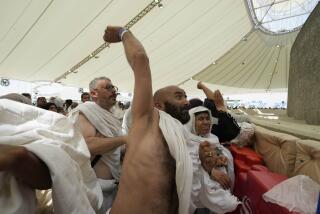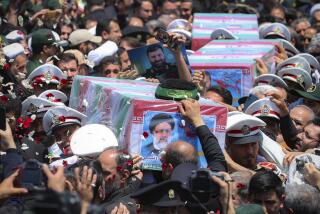Shiites rise on a martyr’s shoulders
BAGHDAD — As Shiite Arabs observe their most significant and distinctive holiday, they stand at a critical juncture, one marked by potential peril and once-unimaginable opportunity for their sect, its members long considered second-class citizens in the Sunni Arab-dominated Middle East.
Ashura, the hectic 10-day ceremony that culminates today and marks the 7th century martyrdom of Imam Hussein, a grandson of the prophet Muhammad, has leaped in importance in the Arab world since the 2003 U.S.-led invasion of Iraq that toppled Saddam Hussein and his Sunni regime.
“Ashura is the marquee event of Shiism,” said Vali Nasr, a scholar at Monterey’s Naval Postgraduate School and author of “The Shia Revival: How Conflicts Within Islam Will Shape the Future.”
Near the shrine of Imam Hussein in the Iraqi city of Karbala, where the Shiite Muslim figure was felled in an AD 680 battle that hardened the rift between Islam’s two major sects, boys as young as 7 marched Monday with green headbands and black robes. Blood spattered the asphalt streets around the shrine complex housing the remains of Hussein and his brother, Abbas, as young men whipped their backs raw and gashed their heads with swords.
Hundreds of thousands of pilgrims from around Iraq as well as neighboring Iran and other countries braved Iraq’s perilous roads for the annual observance. “I do this out of my love for Imam Hussein,” said Hussein Mohammed Ali, a 16-year-old high school student ritually beating himself with a chain during a procession in Karbala. “I want to feel the pain he was feeling.”
Meanwhile, in the southern Beirut stronghold of the Shiite militant group Hezbollah, near the Hay Abyad mosque, young men handed out sweets in plastic goblets to passersby. Old men and women wiped tears as they mourned Hussein, killed in battle by a Sunni tribal leader named Yazid.
Shiites believe Hussein and his descendants were unjustly robbed of their birthright in a succession dispute that defines the continuing conflict between Shiites and Sunnis.
The powerful story of Hussein continues to drive Shiite hopes and fears, including in Lebanon, where last summer’s war between Israel and Hassan Nasrallah’s Hezbollah militia economically devastated the country’s Shiite plurality and intensified a domestic political struggle that has left dozens dead and injured in recent days.
“In every age, there is a Yazid and a Hussein,” said Mohammed Jaafar, a 21-year-old Shiite university student taking part in Ashura ceremonies in Beirut.
“The leaders of arrogant states like the United States and Britain as well as their agents here in Lebanon are the equivalents of Yazid,” he said. “The resistance led by Sayed Hassan [Nasrallah] represents, on the other hand, the true path of Islam: that of Imam Hussein.”
For centuries, Shiite communities were considered an underclass in Arab countries, oppressed by more powerful and wealthy Sunni leaders, even where Shiites constituted a majority, as in Iraq and Bahrain. Although Iran is predominantly Shiite, it was the U.S.-led invasion of Iraq that produced the Arab world’s first Shiite-controlled country, an event Abdelaziz Hakim, leader of Iraq’s main Shiite political coalition, calls the “Ashura Revolution.”
The effect throughout the Middle East and beyond has been electrifying. In Sunni-ruled Kuwait, Bahrain and Saudi Arabia, where Shiites until recently were barred from celebrating Ashura, Shiites pressed for more rights. In Saudi Arabia, the government complied when Shiites demanded they be granted the right to celebrate Ashura in the open. “For a very long time, Shiites in Lebanon were unjustly treated. They were marginalized,” said Hussein Jouni, a 34-year-old clerk who took his two children to participate in one of Beirut’s numerous Ashura gatherings. “Today, Shiites are stronger than ever against any external enemy.”
Their demands for rights have upset the centuries-old balance of power in the region, but also created new democratic openings in autocratic Sunni regimes.
“Shiites have been pushing for constitutional politics and strong parliaments,” said Yitzhak Nakash, a professor of Middle East studies at Brandeis University and the author of “Reaching for Power: The Shia in the Modern Arab World.”
“If strong parliamentary systems develop in the Persian Gulf they would provide a platform for organized opposition, enact legislation and hold rulers accountable,” he said.
But the emergence of Shiite Arabs as significant players on the world stage has been riddled with conflict. Sunni Arabs often refuse to embrace Shiites as fellow Arabs, sometimes deriding them as Iranian agents.
Signs of Sunni rejection of Shiite Arabs abound.
Sunni extremists bombed the Golden Mosque in Samarra, an important Shiite shrine, last February, an attack that served as a tipping point in Iraq’s sectarian civil war. Sunni clerics have issued edicts against Shiites. Jordanian King Abdullah II has warned of an emerging Shiite crescent stretching from Iran to the Mediterranean. Egyptian President Hosni Mubarak has said Shiite Arabs were more loyal to Tehran than their own nations. And as he stood at the gallows, Saddam Hussein cursed his executioners as “Persians.”
Shiites “went from a high expectation and enthusiasm for having a very positive future to a feeling of being in a state of siege,” said Nasr, the scholar.
“This kind of anxiety is playing mind games” with Shiites, he said. “It has shifted the power from the moderates to much more radical elements.”
Those include anti-U.S. Iraqi cleric Muqtada Sadr, the Hezbollah movement and Iranian President Mahmoud Ahmadinejad, who has set his nation on a collision course with the West in his push to attain nuclear technology.
Iran’s theocratic government considers itself the patron and guardian of Shiite communities and holy sites from South Asia to the Levant. But Arab Shiites say they are struggling to forge their own cultural identity separate from Iran and demand respect for their rites and beliefs by Sunni Arabs.
“Sunnis respect Ashura? They would never,” said Majed Sheikhan Jumeili, 45, a Karbala blacksmith taking part in Ashura ceremonies. “They say we are pagans that worship false prophets.”
Analysts say Hezbollah’s war last summer against Israel signified in part an effort to show that Shiites were part of the Arab world’s major struggles. Shiite Arabs today believe that Hussein’s battle against insurmountable odds on the fields of Karbala remains a metaphor for Islam’s struggles.
“When I look into the eyes of our young resistance fighters, I see the teaching of Imam Hussein engraved in them,” said Haj Ahmad Mouzheir, a 64-year-old taxi driver who lives in south Beirut. “The leaders of the resistance are not seeking rank and power but are following the path of the Imam Hussein.”
*
Times staff writer Daragahi reported from Baghdad and special correspondent Rafei from Beirut. A special correspondent in Karbala contributed to this report.
More to Read
Sign up for Essential California
The most important California stories and recommendations in your inbox every morning.
You may occasionally receive promotional content from the Los Angeles Times.










